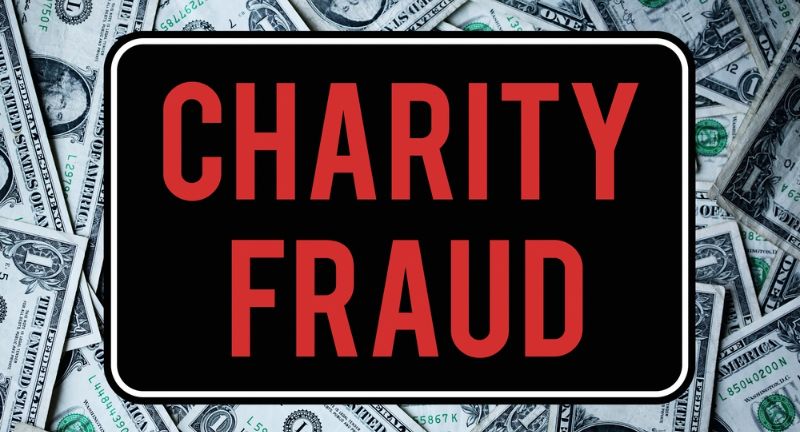NEWS
25 Scams Aimed Squarely at Seniors
Published
9 months agoon

Shutterstock
As technology advances, scams targeting older adults are becoming increasingly complex and widespread, jeopardizing their financial security. Older individuals are often targeted by scammers because of their perceived wealth, trust in others, and unfamiliarity with technology. This article outlines 25 common scams aimed at older people, highlighting the various tactics scammers employ to exploit them. From traditional phone scams to sophisticated online schemes, awareness of these tactics is crucial for protection. By understanding how these scams work and adopting prevention strategies, seniors and their caregivers can avoid falling prey to these fraudulent activities and remain safe in today’s ever-changing world.
Charity Scams

Shutterstock
Charity scams involve fraudsters posing as representatives of fictitious charitable organizations to solicit donations, particularly during periods of crisis or festive seasons. These deceitful practices frequently target senior citizens, capitalizing on their benevolent nature. To safeguard against such scams, it is essential to verify the legitimacy of a charity before contributing any funds.
Caution Against Fake Anti-Aging Products

Shutterstock
An increasing worry surrounds fake anti-aging products aimed at older adults. These deceptive schemes often guarantee astounding results but provide either useless skincare products or possibly dangerous health supplements. The fraudsters exploit the desire of individuals to maintain youth and health. Seniors are advised to seek advice from healthcare professionals before experimenting with any new health or skincare items.
Beware of Health-Related Charity Scams

Shutterstock
Older adults frequently fall prey to fraudsters exploiting widespread health concerns like cancer and Alzheimer’s disease. These criminals often masquerade as charitable entities soliciting donations for fictitious research projects or support networks. Always ensure the authenticity of health-related charities before making any donations.
Homeowner and Reverse Mortgage Fraud

Shutterstock
Homeowners, particularly those who have fully paid off their homes, are frequently targeted by scammers. These fraudsters may impersonate real estate agents or lenders, offering bogus refinancing deals. Reverse mortgage scams are particularly destructive, as they can result in homeowners losing their residences. It is crucial for homeowners to thoroughly vet any individual or entity proposing mortgage or refinancing services.
Stay Alert to Jury Duty Scams

Shutterstock
Be cautious of fraudsters targeting seniors with claims that they failed to attend jury duty and now face fines or potential arrest. These scammers aim to obtain personal information or money. Remember, courts generally communicate jury duty notifications via mail and do not ask for payments over the phone.
Beware of IRS Impersonation Scams

Shutterstock
Recent reports indicate that scammers are impersonating IRS agents, demanding immediate payment for supposed back taxes and threatening arrest if payment is not made. It is crucial to remember that the IRS usually addresses tax matters through mailed correspondence, rather than phone calls. If you receive an unexpected call, it is advisable to hang up and directly contact the IRS to confirm the validity of the claim.
Be Cautious of Utility Scams

Shutterstock
Stay alert for individuals posing as utility company employees or officials who insist that you have an outstanding balance and threaten to cut off your service. These fraudsters usually require prompt payment via non-retraceable means like gift cards. Remember, credible utility companies commonly issue several overdue notices and do not request payment through gift cards.
Grandparent Scam

Shutterstock
The Grandparent Scam is a frequent con where a fraudster phones an elderly individual, impersonating their grandchild and claiming to be in dire need of financial help. Exploiting the grandparent’s emotions, the scammer creates urgency and often begs them not to inform other family members. Seniors should always verify these claims with another family member before transferring any money.
Caution Against Timeshare Reselling Scams

Shutterstock
Seniors are often targeted by companies offering to resell timeshares, guaranteeing a speedy sale for a predetermined fee. Regrettably, these sales rarely happen, resulting in a loss of the upfront fee. It is crucial to be wary of unsolicited proposals to buy or sell timeshares, particularly those that require advance payments.
Avoiding Travel Scams

Shutterstock
Be cautious of travel scams that tempt you with nonexistent or deceptively cheap vacation packages. These fraudulent offers may include hidden fees or be entirely fake. To prevent becoming a victim, it is advisable for seniors to book their travel only through reputable agencies and to thoroughly verify all details before making any payments.
Beware of Fake Prescription Drugs

Shutterstock
Many senior citizens are looking for ways to lower their medication costs, making them vulnerable to online pharmacies that offer counterfeit or inferior drugs. This fraudulent activity often happens through unsolicited emails or suspicious websites. Victims of these scams may unknowingly purchase drugs that are either ineffective or dangerous to their health. Therefore, it is crucial for seniors to obtain their medications only from reputable sources.
Investment Scams Targeting Retirees

Shutterstock
Retirees often become targets of fraudulent investment scams that promise high returns. Schemes like Ponzi schemes may seem convincing at first but usually lead to individuals losing all their savings. It is essential to consult a reputable financial advisor before making any investment decisions to avoid becoming a victim of these deceptive practices.
Seniors and Debt Collection Scams

Shutterstock
Older adults are at risk of being targeted by fraudulent debt collectors who falsely insist that they owe money. These scammers frequently use intimidation and threats to coerce their victims. It’s crucial for seniors to request written verification of any debt, as the Fair Debt Collection Practices Act grants them this right.
Fraudulent Accident Plot

Shutterstock
A deceitful person deceives an elderly individual into thinking that a relative has been admitted to the hospital and urgently needs money for medical expenses. This preys on the elderly person’s fears and willingness to offer immediate help. It’s crucial to verify such claims with the family member directly.
Internet Fraud

Shutterstock
Internet fraud specifically targets seniors using email phishing scams wherein they are tricked into disclosing personal information. Scammers frequently pose as banks or government agencies to earn the victims’ trust. Seniors also face the danger of inadvertently downloading malware, which can steal data directly from their devices. To avoid becoming victims of these scams, seniors should avoid clicking on suspicious links and ensure their security software is always up to date.
Beware of Lottery and Sweepstakes Scams

Shutterstock
Lottery and sweepstakes scams trick victims by informing them that they have won a prize, but in order to claim it, they must first pay a fee. The promised prize does not actually exist. Sometimes, scammers might even ask for bank account information, pretending it’s needed to deposit the winnings. It’s crucial for seniors to be aware and remember that real lotteries never ask winners to pay fees upfront.
How to Avoid Scams Related to Funerals and Cemeteries

Shutterstock
Scammers frequently exploit grieving families by reading obituaries and falsely claiming that the deceased owed them money. Furthermore, some unscrupulous funeral homes may overcharge families who are unfamiliar with typical funeral costs. To protect yourself from these scams, it is essential to research the reputation of funeral service providers and familiarize yourself with standard pricing for funeral services.
Sweetheart Scams

Shutterstock
Sweetheart scams involve online fraud where scammers exploit seniors in romantic relationships to gain financial benefits. These fraudsters often feign love and may request money for emergencies or travel expenses. Caution is essential in online relationships, particularly when someone quickly expresses love or seeks financial help.
Beware of Rental Scams

Shutterstock
Older adults looking for rental homes need to be aware of scams where fraudsters pretend to own a property. These scammers might ask for deposits or rent for homes that are not available or don’t exist at all. To protect yourself from these scams, it’s crucial to visit the property in person and verify its ownership before making any payments.
Beware of Telemarketing and Phone Scams

Shutterstock
Telemarketing and phone scams involve various fraudulent activities, including fake charities, lottery schemes, and misleading investment opportunities. These scammers frequently target older adults, using high-pressure sales tactics and emotional manipulation to deceive them. Unfortunately, tracing these fraudulent calls is challenging, and recovering any money sent to scammers is nearly impossible. It is essential for seniors to be vigilant and cautious when receiving unsolicited calls, especially those demanding money.
Beware of Fake Social Security Calls

Shutterstock
Scammers are targeting seniors by falsely claiming there’s a problem with their Social Security account, number, or benefits, and then asking for personal information. It’s crucial to understand that the Social Security Administration (SSA) typically does not contact individuals to request personal information unless there is a specific reason. If seniors receive a suspicious call, they should hang up right away and contact the SSA directly to verify any issues.
Medicare/Health Insurance Scams

Shutterstock
Individuals posing as Medicare officials may deceive seniors into divulging personal information by claiming it’s for updating records or issuing new cards. Such actions can lead to identity theft or unauthorized insurance charges. Seniors should verify the authenticity of anyone asserting they are from Medicare.
Beware of Computer Tech Support Scams

Shutterstock
Scammers often pose as computer technicians from well-known companies and deceive older adults by claiming that their computers are infected with a virus. They offer to fix the issue for a fee, but instead, they may install harmful software. These fraudsters can also gain remote access to personal information stored on the victim’s computer. It is crucial for seniors to never allow remote access to their computers unless they have initiated the contact for assistance.
Beware of Prescription Discount Card Scams

Shutterstock
Seniors are frequently targeted with offers for discount prescription cards that claim to provide savings on medications. Unfortunately, these cards are often scams intended to steal personal information or deceive individuals into paying a subscription fee. To avoid these fraudulent schemes, it is advised to only use well-known and reputable prescription discount programs or insurance.
Caution Against the Pigeon Drop Scam

Shutterstock
In this scam, a con artist approaches an elderly person, pretending to have found a large sum of money. They offer to share it if the elderly victim makes a ‘good faith’ payment first. Once the payment is made, the victim never receives the money, and the scammer vanishes. It is important to be wary of strangers who offer unexpected financial deals.
Conclusion

Shutterstock
Protecting older individuals from scams requires awareness and vigilance. Scammers exploit vulnerabilities such as trust and financial concerns, targeting seniors with fake prescription drugs and timeshare reselling schemes. It is important for seniors, their families, and caregivers to stay informed about these fraudulent tactics. Approach unsolicited offers and requests for personal information with caution, and seek legitimate advice when in doubt. Educating oneself about common signs of scams can help prevent falling victim to deceitful practices. Remember, it’s better to be skeptical and verify before trusting. Always seek professional guidance when needed.
More Money + Investing
-


24 Items That Are Too Pricey for Shoppers Now
-


25 Epic Car Flops That Made History
-


24 Cars to Buy Now Before Their Value Skyrockets
-


Unmasking Kirkland: The Big Brands Behind Costco’s Best Buys
-


15 Spending Habits That Shout ‘I’m Flat Broke!’
-


20 Great Low Population Places In America To Retire In
-


20 Budget-Friendly Foods for a Healthier Heart
-


Mortgage Demand Continues to Fall Despite Drop In Interest Rates
-


15 Things You Should Never Do At A Funeral
-


20 Witty Reasons Mature Women Are Choosing the Single Life
-


21 Items Savvy Shoppers Skip
-


15 Powerful Arguments to Ban Electric Cars Permanently
